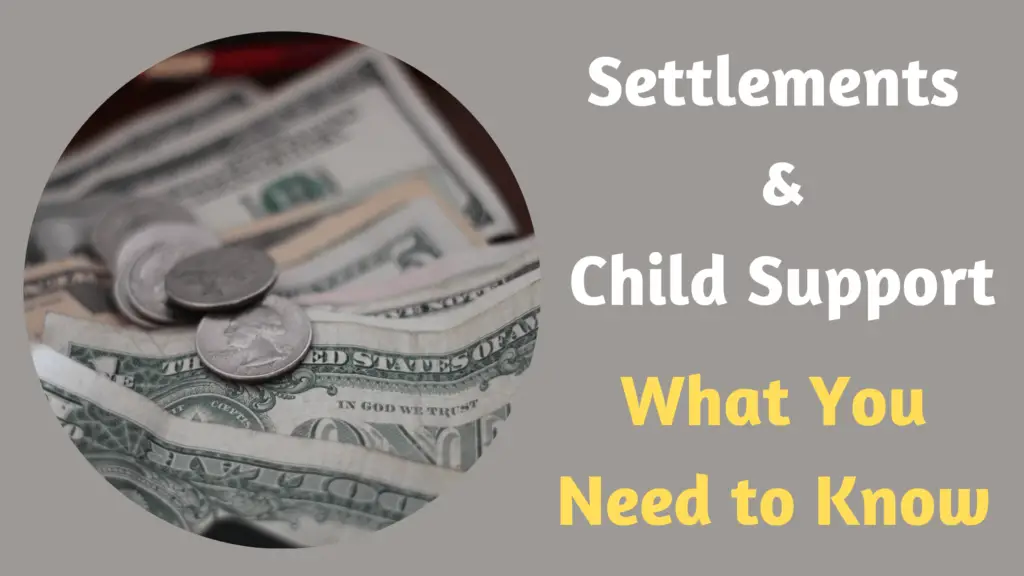Child support stands as a vital foundation for safeguarding the financial welfare of children in families that have gone through separation or divorce. It constitutes a legal duty usually established through a court decree, and the payment amount hinges on diverse factors, encompassing the parents’ income and financial situation. Nonetheless, when one parent obtains a substantial settlement, it prompts inquiries about how does child support know about settlement and how they could potentially impact the obligations related to child support.
So, how does child support know about settlement? Child support mainly get to know about settlement through six ways. These are mandatory reporting, court notifications, self-reporting, lien filing, data sharing and third-party reporting.
Significance of Settlements in Child Support Cases
Child support cases revolve around ensuring that children receive the financial support they need to thrive. Settlements, in this context, refer to any financial agreements or sums of money received outside of regular income. These settlements can have a significant impact on child support obligations.
The Significance of Settlements
Settlements hold significant importance due to their potential to fundamentally impact child support payments and arrangements. When one parent receives a settlement, it has the potential to alter their financial circumstances, which may necessitate adjustments to the existing child support order. These settlements can vary widely in scale, ranging from relatively minor windfalls to substantial sums resulting from personal injury lawsuits, divorce settlements, or insurance claims. The key takeaway is that settlements have the capacity to bring about substantial shifts in a parent’s income and available resources, thereby influencing their child support obligations.
The Necessity of Transparency
Transparency plays a crucial role in child support cases. Both parents should be open and honest about their financial situations to ensure that child support orders remain equitable and accurate. Failing to disclose information about settlements can lead to legal consequences, underscoring the importance of comprehending reporting requirements and the potential ramifications of non-compliance.
Reporting Requirements
Reporting settlements in child support cases is not just a matter of ethical responsibility; it’s a legal obligation. The responsibility for reporting settlements typically falls on various parties involved in the settlement process.
Who is Required to Report Settlements?
- Parents Involved: If you are a parent involved in a child support case and you receive a settlement, you are generally required to report it to the child support agency. The obligation is not limited to the custodial parent; non-custodial parents are also obligated to report settlements they receive.
- Attorneys: Attorneys representing clients in child support cases are often obliged to report settlements reached on behalf of their clients. This ensures that legal professionals are aware of their role in facilitating transparent reporting.
- Employers: Employers play a crucial role in the reporting process. If a parent who owes child support payments receives a settlement and reports it to their employer, the employer may be required to inform the child support agency. This mechanism adds an extra layer of accountability.
Read About: Do You Need a Lawyer for Child Support
Consequences of Failing to Report Settlements
Failing to report settlements can lead to a range of negative consequences, including:
- Legal Penalties: Most jurisdictions have laws in place to penalize parents who fail to report settlements. These penalties can include fines, contempt of court charges, or other legal repercussions.
- Overdue Child Support Payments: When settlements are not reported, the child support agency may not be aware of the change in the paying parent’s financial circumstances. This can lead to overdue child support payments.
- Potential Modifications: If a settlement significantly alters a parent’s financial situation and it goes unreported, it may result in a delay in modifying the child support order to reflect the new financial reality.

How Does Child Support Know About Settlement
Child support agencies employ various methods to identify settlements that may impact child support obligations. These mechanisms are in place to ensure that child support orders remain fair and equitable.
1. Mandatory Reporting
In many jurisdictions, laws require individuals involved in a settlement, such as attorneys, insurance companies, and the parties themselves, to report the settlement to the child support agency. This mandatory reporting is a crucial step in the process, as it helps ensure that child support obligations are addressed as part of the settlement negotiations.
2. Court Notifications
In an ongoing child support case, if a settlement is reached in a separate legal matter like a divorce or personal injury lawsuit, the court responsible for that settlement may inform the appropriate child support agency. This notification is crucial for revising the child support order to reflect the changed financial situation stemming from the settlement. It acts as an inherent protective measure to prevent settlements from unintentionally affecting child support responsibilities.
3. Self-Reporting
Self-reporting is another key method through which child support agencies become aware of settlements. If a parent who owes child support reports that they have received a settlement, the child support agency will be notified. This underscores the importance of open communication and compliance with reporting requirements.
4. Lien Filing
Another noteworthy mechanism is the filing of liens against settlements. This can be initiated by either the custodial parent or the child support agency. A lien is essentially a legal claim on the settlement funds, ensuring that any outstanding child support payments are satisfied before the remaining funds are disbursed. It provides an effective way to secure child support payments when settlements are involved.
5. Data Sharing
Child support agencies often engage in data sharing with other government entities, such as the Internal Revenue Service (IRS) and the Department of Motor Vehicles (DMV). This collaboration helps agencies identify parents who have received settlements. For instance, if a parent fails to report a settlement but the IRS records indicate a substantial increase in income, it can trigger an investigation by the child support agency.
6. Third-Party Reporting
External parties, such as insurance companies and legal representatives, can also have a part in communicating settlements to child support agencies. For instance, if an insurance company resolves a claim regarding a child’s medical costs, they might inform the child support agency to guarantee the child’s financial requirements are addressed. This mechanism introduces an additional level of oversight to the reporting process, involving external entities with a vested interest in upholding compliance.
Voluntary Reporting
While there are mechanisms in place for reporting settlements, it’s essential for parents involved in child support cases to understand the benefits of voluntary reporting.
Benefits of Voluntary Reporting
- Avoiding Legal Consequences: Voluntarily reporting settlements can help parents avoid legal penalties for failing to disclose financial changes. It’s a proactive step toward compliance.
- Maintaining Fairness: Voluntary reporting ensures that child support orders remain fair and accurate, reflecting the current financial circumstances of both parents. It promotes equity.
- Minimizing Delays: Voluntary reporting can expedite the process of modifying child support orders, if necessary, based on the settlement. This can help parents avoid undue financial burdens and uncertainties.
Both custodial and non-custodial parents have a responsibility to inform the child support agency about settlements. Open and honest communication is key to ensuring that child support orders are adjusted appropriately when needed. It’s a shared responsibility that contributes to the smooth operation of the child support system.

Impact of Settlements on Child Support
Understanding how settlements can affect child support orders is crucial for both custodial and non-custodial parents.
Settlements can lead to modifications in child support orders. If a parent’s financial situation significantly changes due to a settlement, it may warrant a review and adjustment of the child support order. This is a crucial step to ensure that the child’s needs continue to be met adequately.
The criteria for modifying child support orders vary by jurisdiction but commonly include:
- A Substantial Change in Income: If there is a significant change in the income or financial circumstances of one or both parents, it may trigger a review of the child support order.
- Changes in the Child’s Needs: Changes in the child’s needs, such as increased medical expenses or educational costs, can also be grounds for modification.
- Time Since the Last Review: In some jurisdictions, the passage of a significant amount of time since the last review of the child support order can be a factor.
Read About: How to Win a Child Support Modification Case
Seeking Legal Advice
Navigating child support matters, especially when settlements are involved, can be intricate and laden with legal complexities. Seeking legal counsel is often advisable.
Consulting with an attorney specializing in family law can provide several benefits:
- Expertise: Attorneys are well-versed in the nuances of child support laws and regulations, ensuring that you receive expert guidance.
- Protection of Rights: Legal counsel ensures that your rights and interests are protected throughout the process. They act as advocates for your legal rights.
- Compliance: Attorneys can help you comply with reporting requirements and advocate for fair child support orders that align with your circumstances.
It’s essential to comply with local laws and regulations governing child support and settlements. Legal professionals are well-versed in these regulations and can help you navigate them effectively. They can provide guidance on compliance, ensuring that you follow the law while protecting your rights and interests.
Conclusion
Understanding how does child support know about settlement is vital for both custodial and non-custodial parents. Settlements can significantly impact child support obligations, and transparency in reporting is essential to ensure that child support orders remain fair and equitable.
Whether you’re a parent involved in a child support case or someone seeking information on this topic, remember the following key points:
- Settlements can affect child support payments and arrangements, potentially leading to modifications.
- Reporting settlements is a legal obligation, and failing to do so can result in legal consequences.
- Child support agencies employ various methods to discover settlements, including mandatory reporting, court notifications, self-reporting, lien filing, data sharing, and third-party reporting.
- Voluntary reporting is beneficial for all parties involved, promoting fairness and expediting necessary modifications.
- Seeking legal advice is advisable to navigate child support matters effectively and ensure compliance with the law.
By understanding these principles and complying with reporting requirements, parents can contribute to a fair and just child support system that prioritizes the well-being of children.







